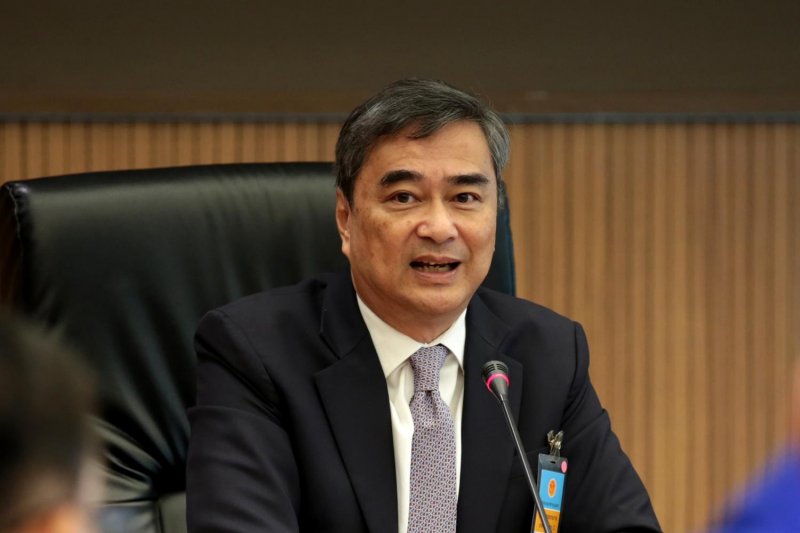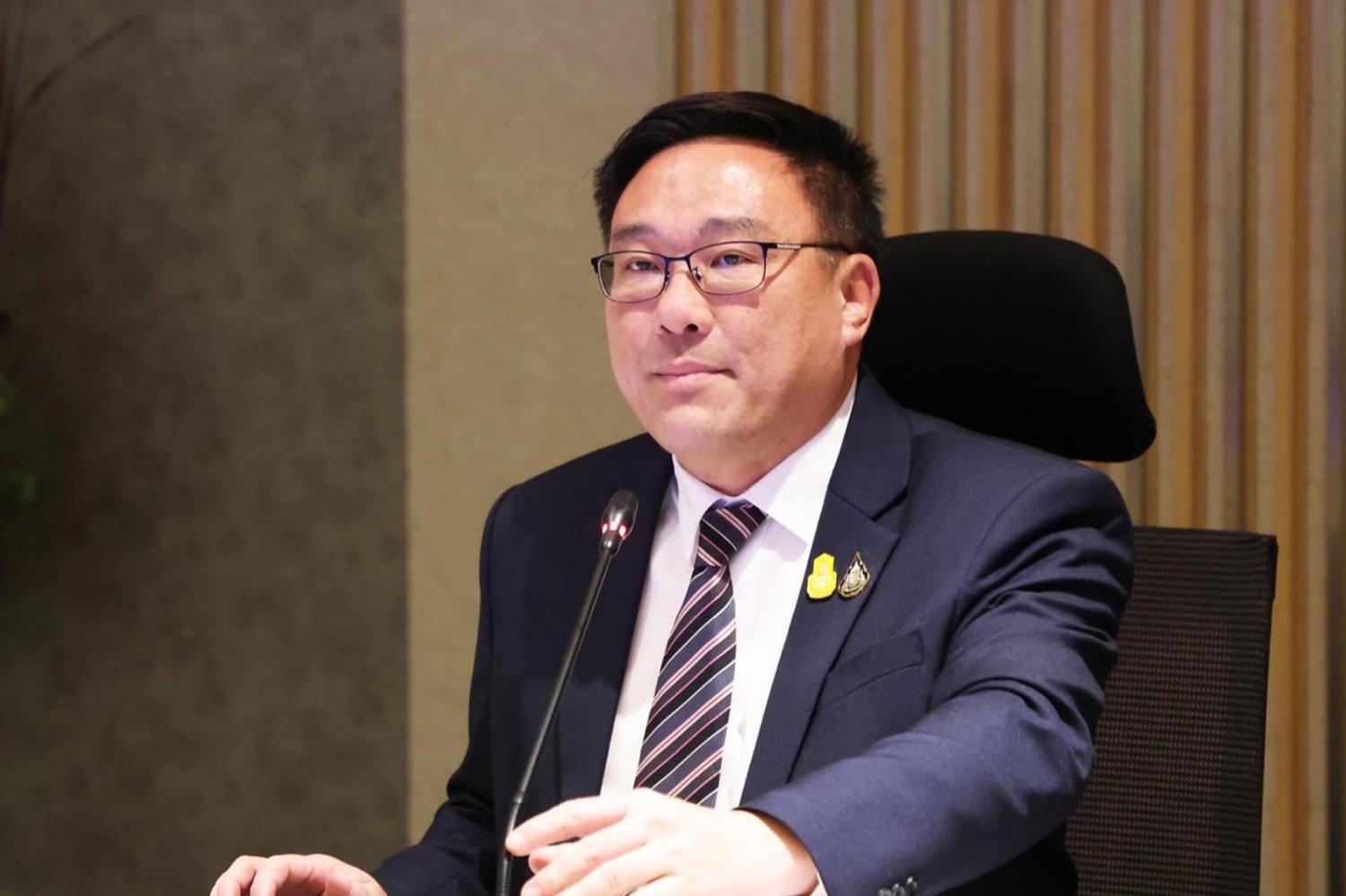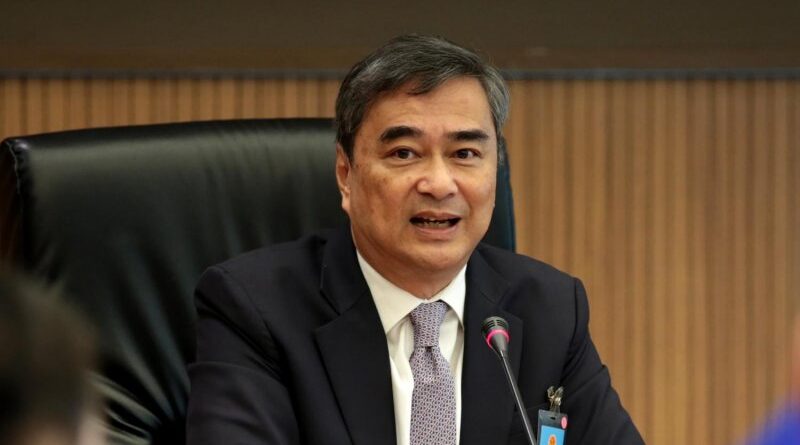Old dogs need new tricks

With the return of Abhisit and the ‘old guard’, the Democrat Party now faces a nostalgia trap amid calls for reform and fresh ideas v Pheu Thai is aiming for renewal with a new figurehead, but Julapun will still likely play second fiddle to Thaksin.
Former prime minister Abhisit Vejjajiva’s return to lead the Democrat Party has brought back a familiar sense of order — and the familiar faces that once defined Thailand’s oldest political institution.
Yet, instead of energising the base or attracting new followers, the re-emergence of the old guard has underscored how the party remains trapped between nostalgia and the need for reinvention.
Mr Abhisit’s reinstatement, following years of internal disarray and dwindling electoral fortunes, initially rekindled hopes among Democrat loyalists that the party might recover from its humiliating defeats in recent elections.
His steady hand and intellectual rigour, long considered assets during his premiership from 2008 to 2011, stand in stark contrast to the previous executive board led by Chalermchai Sri-on, whose stewardship failed to restore credibility or direction.
Under Mr Chalermchai, the party was reduced to a marginal player in politics, losing its once-dominant position in Bangkok and the South — its traditional strongholds. The return of Mr Abhisit, therefore, represents a symbolic restoration of leadership discipline and ideological clarity. But symbols alone may not translate into votes.
Mr Abhisit’s leadership team, populated largely by party veterans, ex-ministers, and former MPs who had served alongside him in the late 2000s and early 2010s, suggests a retreat to comfort rather than an embrace of renewal.
Figures such as Korn Chatikavanij and Chinnaworn Boonyakiat — respected but politically dated — form the backbone of the party’s reconstituted executive committee. Their combined experience lends institutional stability, but critics argue it also projects an image of stagnation.
Analysts note that while the return of the “Abhisit generation” may improve the party’s internal coherence, it fails to address the deeper problem of relevance.
Thai voters, particularly younger ones, increasingly gravitate toward newer, more dynamic players such as the People’s Party (PP), which addresses contemporary concerns ranging from digital rights and environmental policy to economic innovation.
The Democrats, meanwhile, continue to rely on a technocratic, policy-heavy message that appeals to an ever-shrinking segment of middle-class voters.
Equally daunting for Mr Abhisit is the party’s chronic shortage of financial resources. Once backed by deep-pocketed southern businessmen and Bangkok elites, the Democrat Party now finds itself outspent and outmanoeuvred by rivals with far more substantial war chests.
Without powerful financial patrons, running a competitive national campaign will be an uphill battle, according to a political source.
Fundraising difficulties are compounded by the party’s weak organisational networks at the grassroots level. Years of electoral decline have hollowed out local support structures.
In many southern provinces, traditional Democrat canvassers have defected to the Bhumjaithai Party or United Thai Nation Party, drawn by the prospect of patronage and influence. In Bangkok, a new generation of urban voters, long alienated by the Democrats’ perceived conservatism and their failure to articulate a clear post-coup stance, has shifted towards the PP.
As one political scientist observed: “Mr Abhisit’s problem isn’t competence — it’s currency. He’s a man from another era, speaking to an electorate that has moved on.”
Mr Abhisit’s personal brand — clean, principled, and moderate — still commands respect in elite circles and among older voters nostalgic for stability.
His re-entry might restore a degree of moral legitimacy to the party’s leadership, particularly after internal scandals and defections. But that moral high ground alone cannot replace the need for political imagination.
The Democrat Party’s policy platform under Mr Abhisit remains vague. While he has emphasised economic fairness, no bold new ideas have emerged to distinguish the Democrats from the competition.
The absence of youthful, policy-driven figures within the new executive committee further bolstered the perception of a party stuck in the past.
Moreover, Mr Abhisit faces the delicate task of reconciling his pro-democracy principles with the pragmatic alliances needed to survive in Thailand’s fractious political landscape.
His earlier resignation as MP in 2019 — over the party’s support for Prayut Chan-o-cha’s premiership — earned him moral credibility but cost the party political leverage. Whether he can balance those ideals with the compromises necessary for political survival remains to be seen.
With elections likely in the beginning of next year, the Democrats face a critical question: can Abhisit transform nostalgia into momentum? The early signs are not encouraging.
Polls show the party languishing in single digits nationwide, with its support concentrated among older voters in a few southern provinces.
Reclaiming urban constituencies, particularly in Bangkok, would require a major rebranding that Mr Abhisit has yet to initiate.
Some insiders believe that Mr Abhisit’s strategy may not focus on outright victory but rather on rebuilding the party’s credibility and moral identity as a centrist alternative — a long-term project aimed at survival rather than immediate success.
If so, the current leadership lineup may serve as a transitional phase: a bridge between the old Democrats and whatever form the party must take to remain relevant.
Yet the clock is ticking. The Democrat Party, once synonymous with principled liberalism and modern political discourse, now risks becoming a relic. Mr Abhisit’s return offers the party a final chance to reclaim purpose.
But without fresh ideas, young blood, or the financial muscle to compete, that comeback may amount to little more than a respectful last act in a long political story.
Former Higher Education, Science, Research and Innovation Minister Suvit Maesincee said during a seminar at the Democrat Party on Oct 28, 2025, that before winning an election, a party must first “win the hearts of the people”.
“It’s not only about resetting the Democrat Party, but also resetting Thailand — and that’s no easy task. Winning an election doesn’t mean we’ve solved these problems, because what we’re trying to change is the foundation of the country. So we must stay patient and keep our eyes on the long-term balance.”
Mr Suvit insisted the Democrat Party must embrace change. “If the party changes, I believe its spirit, combined with openness to transformation, can move forward. But if step one — changing the party — fails, then step two — changing the country — cannot happen,” he said.

Julapun: Going back to basics
Leadership in name only?
The Pheu Thai Party has chosen Julapun Amornvivat, a five-time MP from Chiang Mai, as its new leader, succeeding Paetongtarn Shinawatra, who resigned to pave the way for the party’s rebranding ahead of the general election.
At 50, Mr Julapun has spent half his life with Pheu Thai and its predecessors, including the now-dissolved Thai Rak Thai Party, never once defecting or stepping away from the party.
Aware that Pheu Thai — still reeling from the leaked audio saga involving Cambodian Senate President Hun Sen and former premier Paetongtarn — is not at its peak, he believes that politics is not decided in a single day and has vowed to restore the party to the top spot.
Under Mr Julapun’s leadership, Pheu Thai is pursuing a “back to basics” policy platform, starting with a “Creating Opportunities, Clearing Debts, Ensuring Livelihoods” campaign to be unveiled soon.
He expressed confidence that, in terms of policy development, Pheu Thai is already ahead of other political parties. Its policy team, headed by Dr Prommin Lertsuridej, a key party figure, will ensure that policies truly resonate with the public.
However, observers say Mr Julapun’s leadership represents another test of whether a Pheu Thai leader can ever be truly in charge.
With former prime minister Thaksin Shinawatra — dubbed by critics as the bona fide owner of the party, looming large behind the scenes — party leaders have had little real say over its direction or policy agenda.
While he is widely regarded as the most suitable choice among other potential candidates, analysts say that, like his predecessors, Mr Julapun is expected to take cues from Thaksin, who is now serving time in prison.
Olarn Thinbangtieo, a political scientist at Burapha University, said that compared with party heavyweights who emerged as strong candidates in the latest party leadership race, with the likes of Chaturon Chaisaeng, Cholnan Srikaew and Sutin Klungsang, Mr Julapun has a clear advantage over other contenders.
He represents a younger generation and comes across as the most knowledgeable in economic affairs, according to Mr Olarn.
In contrast, Mr Chaturon, though widely supported by several members, is seen as too rigid and difficult to negotiate with — to the extent that some in the party have described him as “the second Samak Sundaravej”. Meanwhile, Dr Cholnan, a former Pheu Thai leader, appears politically exhausted.
“This makes Mr Julapun the most presentable and, from Thaksin’s perspective, the easiest to deal with,” said Mr Olarn.
The analyst pointed out that Thaksin’s relationship with his party differs sharply from that of Bhumjaithai (BJT) Party leader Anutin Charnvirakul and his political mentor Newin Chidchob.
According to Mr Olarn, Pheu Thai operates much like a company, with Thaksin as its owner, and he tends to view party members as employees under his management.
On the other hand, Mr Newin, who is considered BJT’s patriarch, keeps his distance and treats Mr Anutin more like a partner.
Pheu Thai’s situation appears to be stabilising after several political families in the party who considered defecting to the Klatham Party are now hesitating in the wake of scandals surrounding Klatham, he said.
Many of these figures are staying put, which has boosted confidence inside Pheu Thai, he said, adding that key figures now predict the party will win no fewer than 100 House seats in the next election.
Mr Olarn said, despite its strong financial backing, Klatham appears to be losing political traction, likely due to efforts to slow its rise.
Several political strategists believe that the People’s Party and BJT have an understanding to contain Klatham, which has openly aimed to become the country’s fourth-largest party.
If left unchecked, the party — which operates under the guidance of Capt Thamanat Prompow — could overtake Pheu Thai, which, according to recent opinion polls, is trailing behind the PP and the BJT.
Though Pheu Thai and Klatham appear to have parted ways, with Klatham being the first coalition partner to withdraw from the previous Paetongtarn cabinet, Mr Olarn doubted that Thaksin and Capt Thamanat, who is the Klatham Party chief adviser, are completely disconnected.
He said it is highly likely that the two parties could realign after the next election when coalition talks begin.
According to Mr Olarn, it is unsurprising that Klatham has been hit by a string of scandals and the situation could worsen as the election draws closer.
Klatham’s current troubles include allegations linking party MP for Songkhla Chonnapat Naksua to an online gambling network.
Mr Chonnapat said the financial records cited were from a 2021 case that had already been cleared by authorities.
Capt Thamanat, who serves as agriculture and cooperatives minister, himself has been accused of having connections with Benjamin Mauerberger, also known as Ben Smith, who is allegedly linked to scam operations.

Source – Bangkok News




